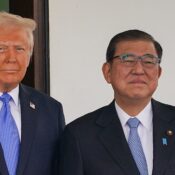
Why is violence in Haiti getting worse?
A few days ago, a horrific, multi-hour gang attack occurred in Haiti that resulted in numerous deaths, set fire to houses and automobiles, and thousands of people fleeing for their safety. It was the most recent setback for a nation that has endured years of terrible conflict.
Gran Grif gang members carried out the early-morning attack in Pont-Sonde, in central Haiti, on Thursday. As the Caribbean island nation battles to end long-standing lawlessness exacerbated by the 2021 killing of Haiti’s president, Jovenel Moise, they shot and killed at least 70 people, including infants.
THE GRAND GRIF GANG: WHO IS IT?
Luckson Elan, the leader of Gran Grif, a lesser-known gang in Haiti, accepted responsibility for the Thursday morning massacre. Elan asserted in a social media audio message that his foot soldiers were taking revenge on the people who, in his words, had assisted a vigilante organization that was stopping the gang from demanding money on a major highway nearby.
Elan, 36, was sanctioned by the US government last week and opened a new tab with Prophane Victor, a former legislator from Haiti who is charged with organizing and supplying neighborhood criminal gangs.
The Office of Foreign Assets Control of the U.S. Department of Treasury said last week that Victor and Elan “have sought to perpetuate the horrific violence and instability through their influence over or leadership of the gangs in Haiti.”
Security specialists claim that Gran Grif is the biggest gang in Haiti’s Artibonite department, which is where most of the country’s rice fields are located. The gang was established when Victor started supplying young men in Petite Riviere with firearms. Among other wrongdoings, the group is notorious for committing acts of gender-based violence, such as raping women and children.
WHY DO GANGS IN HAITI HAVE TOO MUCH POWER?
As the government of the former French colony has deteriorated, Haitian gangs have become more powerful, filling the void and gaining control over important roads and other infrastructure. They are engaged in a variety of illegal activities, such as drug and weapons trafficking and extortion.
The forty-six-year-old former police officer Jimmy “Barbeque” Cherizier is one of the most well-known gangsters in the nation. He has been charged by the UN with involvement in several massacres, including the one that claimed the lives of several dozen people in 2018 when hundreds of houses in the La Saline suburb of the city were set on fire.
Cherizier declared in 2020 that nine gangs in the capital region had united to form an alliance known as G9 Family and Allies. Earlier this year, under his direction, the alliance overran Haiti’s principal petroleum port, impeding travel and depriving vast segments of the populace, including hospitals, of fuel supplies required to run generators.
WHY HAS THE GOVERNMENT FAILED IN ITS ATTAINMENT OF GANG CONTROL?
For many years, Haiti’s government has had difficulty delivering essential services, particularly security. The national police force has lost thousands of policemen in recent years, many of whom were sacked, and others have departed the nation, leaving it chronically understaffed and outgunned.
International groups report that nearly half of the population is facing acute hunger, with some regions of the country on the verge of famine, as a result of the country’s dire economic conditions, which are characterized by high inflation and subpar crops.
The ongoing inability to hold municipal elections has coupled with the worsening security situation.
A temporary electoral body was established by the nation’s interim presidential council earlier this month in an effort to bring back elections and raise hopes for a more stable government. Ten years after the last polls, in 2026, is when the organization tentatively plans to hold elections.
CURRENT STATUS OF THE SECURITY MISSION BACKED BY THE UN?
The international security force that is meant to support local law enforcement in combating gang activity and maintaining order was unanimously authorized by the U.N. Security Council last week for an additional year.
However, the much-delayed security force has been sluggish to mobilize and depends entirely on donations. With barely 400 police officers—mostly from Kenya—on the ground, the operation hasn’t done much to assist Haiti restore order thus far.
Benin, Jamaica, the Bahamas, and Belize have pledged to contribute at least 2,900 troops in addition to U.S. funds and Kenya’s original deployment; however, those deployments have hardly started to materialize.
Two years ago, Haiti’s former government made the initial request for the force. Since then, the gangs have seized control of most of the capital and the surrounding territories, resulting in the mass displacement of about 11 million people nationwide and a humanitarian disaster.
All Categories
Recent Posts
Tags
+13162306000
zoneyetu@yahoo.com



